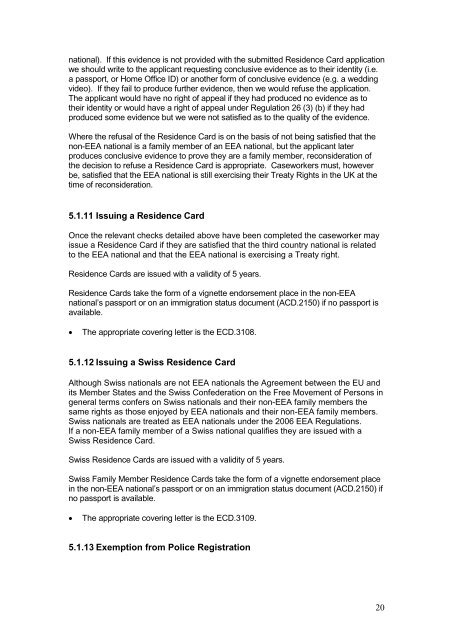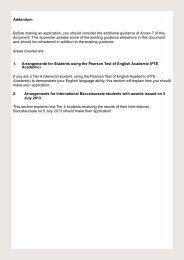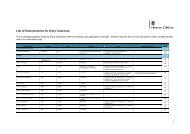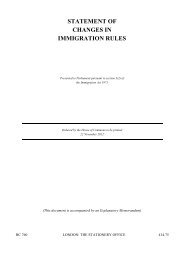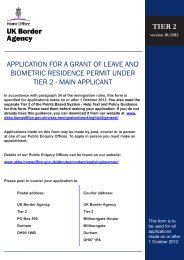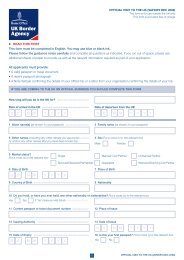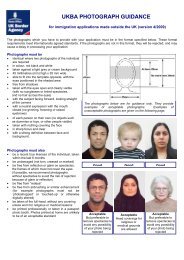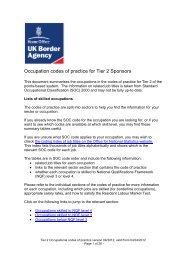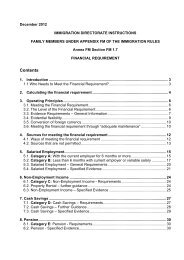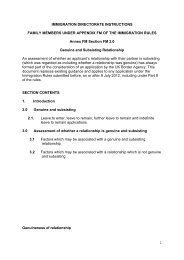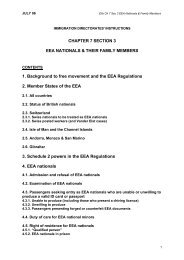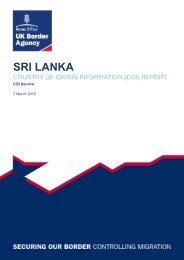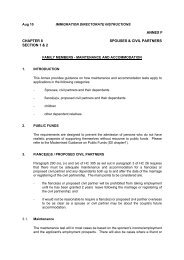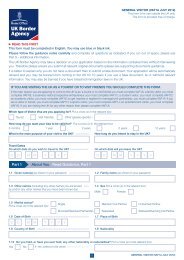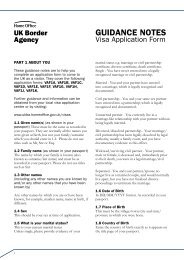Chapter 5 - Residence Card Applications - UK Border Agency ...
Chapter 5 - Residence Card Applications - UK Border Agency ...
Chapter 5 - Residence Card Applications - UK Border Agency ...
Create successful ePaper yourself
Turn your PDF publications into a flip-book with our unique Google optimized e-Paper software.
national). If this evidence is not provided with the submitted <strong>Residence</strong> <strong>Card</strong> application<br />
we should write to the applicant requesting conclusive evidence as to their identity (i.e.<br />
a passport, or Home Office ID) or another form of conclusive evidence (e.g. a wedding<br />
video). If they fail to produce further evidence, then we would refuse the application.<br />
The applicant would have no right of appeal if they had produced no evidence as to<br />
their identity or would have a right of appeal under Regulation 26 (3) (b) if they had<br />
produced some evidence but we were not satisfied as to the quality of the evidence.<br />
Where the refusal of the <strong>Residence</strong> <strong>Card</strong> is on the basis of not being satisfied that the<br />
non-EEA national is a family member of an EEA national, but the applicant later<br />
produces conclusive evidence to prove they are a family member, reconsideration of<br />
the decision to refuse a <strong>Residence</strong> <strong>Card</strong> is appropriate. Caseworkers must, however<br />
be, satisfied that the EEA national is still exercising their Treaty Rights in the <strong>UK</strong> at the<br />
time of reconsideration.<br />
5.1.11 Issuing a <strong>Residence</strong> <strong>Card</strong><br />
Once the relevant checks detailed above have been completed the caseworker may<br />
issue a <strong>Residence</strong> <strong>Card</strong> if they are satisfied that the third country national is related<br />
to the EEA national and that the EEA national is exercising a Treaty right.<br />
<strong>Residence</strong> <strong>Card</strong>s are issued with a validity of 5 years.<br />
<strong>Residence</strong> <strong>Card</strong>s take the form of a vignette endorsement place in the non-EEA<br />
national‟s passport or on an immigration status document (ACD.2150) if no passport is<br />
available.<br />
� The appropriate covering letter is the ECD.3108.<br />
5.1.12 Issuing a Swiss <strong>Residence</strong> <strong>Card</strong><br />
Although Swiss nationals are not EEA nationals the Agreement between the EU and<br />
its Member States and the Swiss Confederation on the Free Movement of Persons in<br />
general terms confers on Swiss nationals and their non-EEA family members the<br />
same rights as those enjoyed by EEA nationals and their non-EEA family members.<br />
Swiss nationals are treated as EEA nationals under the 2006 EEA Regulations.<br />
If a non-EEA family member of a Swiss national qualifies they are issued with a<br />
Swiss <strong>Residence</strong> <strong>Card</strong>.<br />
Swiss <strong>Residence</strong> <strong>Card</strong>s are issued with a validity of 5 years.<br />
Swiss Family Member <strong>Residence</strong> <strong>Card</strong>s take the form of a vignette endorsement place<br />
in the non-EEA national‟s passport or on an immigration status document (ACD.2150) if<br />
no passport is available.<br />
� The appropriate covering letter is the ECD.3109.<br />
5.1.13 Exemption from Police Registration<br />
20


